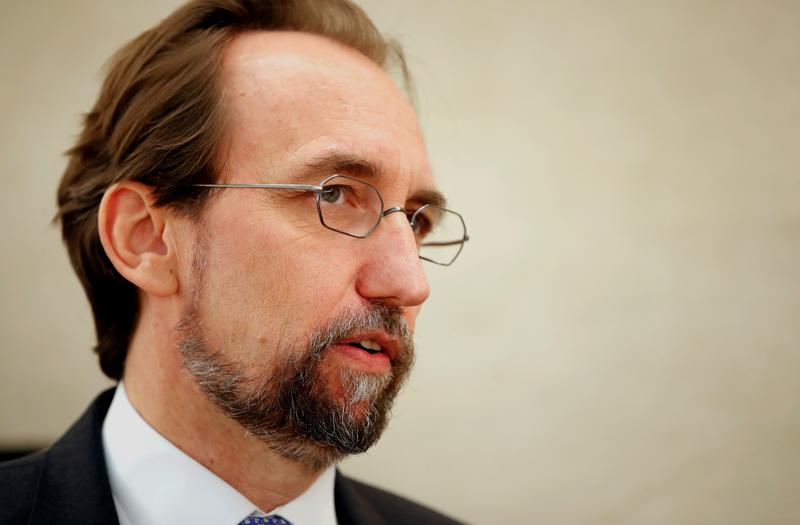The UN human rights chief kept Burma under the microscope in parting remarks to the UN Human Rights Council on Monday, noting the government’s failure to cooperate with multiple probes into alleged rights abuses amid “clear indications of well-organised, widespread and systematic attacks continuing to target the Rohingya in Rakhine State.”
Outgoing UN High Commissioner for Human Rights Zeid Ra’ad al-Hussein has emerged as one of the most high-profile and vocal critics of Burma since violence broke out in Rakhine State in October 2016 and flared anew in August of last year.
More than 700,000 Rohingya have reportedly fled to neighbouring Bangladesh since 2016, when an assault by militants from the Muslim minority on security posts in northern Rakhine prompted an exodus-inducing crackdown by the Burmese military. In August 2017, a larger attack by the militants, who identify as members of the Arakan Rohingya Salvation Army, was met by an even fiercer counter-insurgency campaign. The latter wave of refugees totalled over 680,000.
The flight of hundreds of thousands of Rohingya has grabbed headlines globally, but accusations of “ethnic cleansing” — and, Zeid said in his speech on Monday, “amounting possibly to acts of genocide” — have been repeatedly rejected by the Burmese government.
Human rights groups have spent months documenting abuses allegedly committed by Burmese security forces against the Rohingya, which include claims of mass rape, extrajudicial killings, and the burning of entire villages previously inhabited by members of the Muslim minority.
[related]
The UN Human Rights Council established a fact-finding mission to probe those accusations in March 2017, but the three-member team has been denied access to Burma. Late that year, Burma-UN relations were further strained when the UN special rapporteur on human rights in Burma, Yanghee Lee, was barred from entering the country for the remainder of her tenure, with a government official saying the envoy was biased.
Speaking before the Council in Geneva, Switzerland, Zeid on Monday rejected Burma’s insistence that the situation in Rakhine, as well as allegations of human rights abuses in conflict-torn Kachin and northern Shan states, are domestic affairs to be handled internally.
“Although Myanmar has stated that it will investigate allegations and prosecute alleged perpetrators, its actions to date have not met minimal standards of credibility or impartiality,” he said, adding that in the absence of cooperation from the government in Naypyidaw, “remote monitoring” was being carried out. As part of that effort, both Lee and the fact-finding team have visited the sprawling camps in Bangladesh that continue to host the Rohingya refugees.
Zeid also touched on drawn-out discussions among Burmese and Bangladeshi officials and a handful of UN agencies on repatriating the displaced population, emphasising that “no repatriation should occur in the absence of sustained human rights monitoring on the ground, in the areas concerned.”
Burma has established processing centres and temporary camps to house the refugees, but large-scale repatriation remains a distant prospect, hamstrung by diplomatic wrangling between the respective governments and many refugees’ refusal to return to Rakhine without greater guarantees of rights and safety, among other impediments.
‘Growing menace of chauvinistic nationalism’
In a preamble to country-specific assessments of human rights abuses from Syria to the Democratic Republic of Congo to the administration of US President Donald Trump, Zeid warned of “the growing menace of chauvinistic nationalism,” which he said has “historically [been] the most destructive force to imperil the world … when raised to feral extremes by self-serving, callous leaders, and amplified by mass ideologies which themselves repress freedom.”
Burma is one case study in charting that global trend, with human rights advocates pointing to rising Buddhist nationalism over recent years as a major threat to the country’s transition from decades of dictatorship to democracy. Nationalist sentiment has been at its most virulent, and its invective most inflammatory, in anti-Muslim rhetoric espoused by extremist Buddhist monks and like-minded laypersons.
Reports on Burma from both the special rapporteur Lee and the UN fact-finding mission will be presented to the UN Human Rights Council at its next regular session in September.
Zeid, a Jordanian national who received a standing ovation from those in the council chamber following Monday’s speech, began his four-year tenure as UN High Commissioner for Human Rights on Sept. 1, 2014. He indicated in December of last year that he would not seek a second term, telling his staff that doing so “in the current geopolitical context, might involve bending a knee in supplication; muting a statement of advocacy; lessening the independence and integrity of my voice — which is your voice.”
His successor will be appointed by the UN secretary-general and approved by the UN General Assembly in the coming weeks.



